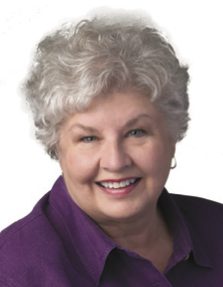
19 Jul 2016 ‘The quick brown fox jumps over the lazy dog’
by Vivian Lawson Hogue
There are times when all I want is an old portable typewriter that I can use while sitting on the deck under a sun-dappling tree. I have one, and I also have the tree, but there is the matter of readily available ribbons and other supplies.
Our first family portable version was for typing school papers and for our dad to send personal and business letters. My brother, Noel, and I learned to type in Miss Tilley’s typing classes at Conway High School. Because we had both played piano for many years, we did fairly well coordinating fingers with keys. From the 1960s through the 80s, we thought technology had hit the high mark with typewriters. We actually had ribbon cartridges with lift-off correction tape. If we didn’t have that luxury, we had white-wheel erasers with a little brush attached to whisk away eraser crumbs.
Any of the typewriters, whether manual or electric, could have been used as a wrecking ball to raze a three-story brick building. Normally, those students who were planning to pursue a business degree in college got to use the humming electric versions. During class, the sound of about 25 sets of clicking keys was deafening. We were taught to keep the tops of our hands horizontal in order to type faster and prevent achy wrists.
There were typing manuals with practice exercises and templates for business letters. These books had built-in folding stands so they could be viewed easier in minimal desk space. If there is one exercise any student typist still remembers, it is, “The quick brown fox jumps over the lazy dog.” All of the alphabet letters in one sentence. All of this “technological knowledge” would come into advanced uses sooner than anyone expected.
There came a time when our family felt our dad should write a book about his “primitive” life growing up in the hills of northeast Arkansas. At the age of 75, he decided to give it a try. The oldest of we siblings found funds, a publisher and editor and created some of the illustrations. The youngest brother provided most of the illustrations as well as photography. There was something all of us could do. My own contribution was primarily serving as proofer, editor and typist.
This would necessitate another typewriter, as my dad’s handwriting was illegible and we lived three hours away. This would be a hefty cost of $25 plus typing supplies and postage. Added to that was the fact that I was also tending to my two children, ages 6 and 3. I sat and typed at the kitchen table daily following the mail that delivered his latest entries. Even with his typewriter, the words sometimes had to be a guess. If he made corrections or had a change-of-mind, he made multiple Xs.
When the ribbon’s ink began fading, I brought out the magnifying glass. When I finished a section, I mailed the original to the oldest brother and a carbon copy to my dad. How much easier could that possibly be?
Dad’s book was published in 1977, and he made the book-signing rounds including War Eagle. In fact, the writing bug had bitten and he wrote another book the following year, published in his 79th year. Seventeen years later, in 1996, I was also bitten and began my newspaper columns. I had been led reluctantly into computer and printer production at home and work, so I sent my columns to the publisher by email. Meanwhile, typewriters took a back seat to the internet, yet were still held close by those who took comfort in the leisure of taking one’s time to think.
I began writing for 501 LIFE in 2012. Even now, I am amazed that I type on a flat, quiet keyboard, and with those keys I can “erase,” go forward or in reverse, type or highlight in colors, store columns on my PC and submit those and photos to the publisher by email. I have had the privilege of writing in 30 of the celebrated 100 issues published by Sonja Keith, Donna Spears and their staff. I thank them for the pleasure I find in throwing words together and sharing them with others.
And those old typewriters? Their legacy was to send people to college, find work for them afterward, help them write books, create business deals, stay in touch with distant friends and send love letters. What a simple machine it was, to have taken us so far.
A native of Conway, Vivian Lawson Hogue graduated from the University of Central Arkansas with a degree in art education. A retired teacher, she worked in the Conway School District for 23 years. She is editor of the Faulkner County Historical Society’s semi-annual publication, “Faulkner Facts and Fiddlings.” She can be reached at [email protected].









